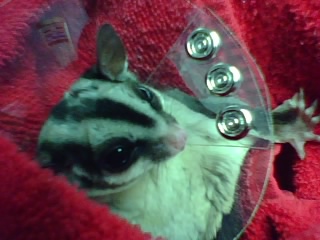We hear it said so often that gliders pass away so quickly.
This is often the case.
However, there are times that their passing is NOT so quick. In those times, it is important to know the signs that your glider is moving toward his/her last moments so that you can be prepared and can keep the glider comfortable. This is not written to encourage you to give up hope, but is written to give you INFORMATION so that you are not taken aback by the symptoms your glider is experiencing.
It is important to note that not all gliders will show all symptoms. They are uniqe and the process they go through is also unique. Some of these signs are seen very rarely. Others are seen rather frequently.
It is also important to note that the display of one symptom does not necessarily mean that death is pending, so vet care is still necessary. Never neglect a visit to the vet.
*******************************
The following are things you might see in your glider as he/she is nearing death.
•
inability to arouse the glider or, ability to only arouse glider with great effort but glider quickly returns to unresponsive state This generally means that death is very near. Usually less than 24 hours. In this time, one might see
- these are seizures that look like the body is stiffening up and/or the glider is chewing. The difference from "normal" seizures is that the glider does not recover or "bounce back" from these seizures. Following the seizure, they remain lethargic and sometimes difficult to arouse. A glider can stay in this state of seizing time after time for up to 48 hours before they pass.
•
Long periods of pausing in the breathing (apnea) - you might find that you think they are "gone" and then you see a breath again. This is usually found within hours of passing.
•
dramatic and frequent changes in the breathing pattern including apnea, but also including very rapid breathing or cyclic changes in the patterns of breathing (such as slow progressing to very fast and then slow again, or shallow progressing to very deep breathing while also changing rate of breathing to very fast and then slow)
•increased respiratory congestion or fluid buildup in lungs - for gliders, even a little bit of congestion can be problematic. You might hear a popping sound when they breathe (different from the "content" popping noise they make - this one is regular with each exhalation).
•inability to swallow or not taking any food/liquid by mouth voluntarily - you may try to syringe or hand feed, but as death approaches, the glider will not take much, if any.
•Significant decrease in urine or fecal output. Urine may darken in color. They may stop pooping. If they have eaten and not pooped within several hours, then there is likely an issue.
•
Tongue hanging out of mouth - usually indicates that death will occur within moments.
•
No attempts to clean self up after urinating or defecating on themselves. •Laying flat - on belly with limbs splayed out to the side. You might find them on the floor of the cage this way, or find that they move to this position while in your watchful care. This usually occurs within hours of passing.
•
Laying on floor of cage or in wheel. May come with heavy breathing, but is not their "normal" curled up sleeping posture. Sometimes they lay on the floor of cage on either their side or back and make no effort to move. Often they will crawl under the wheel. Sometimes they will appear to sleep while hanging on the side of the cage.
•
Dramatic change in disposition - previously crabby, bitey glider allows you to touch and hold them close without any fuss.
•
Glider's extremities (such as hands, arms, feet and legs) feel very cold to touch - you can keep them warm by holding them close to your body or by putting them in an incubator or on heating pad.
•
Glider's body is held in rigid unchanging position - even when you pick him/her up.
